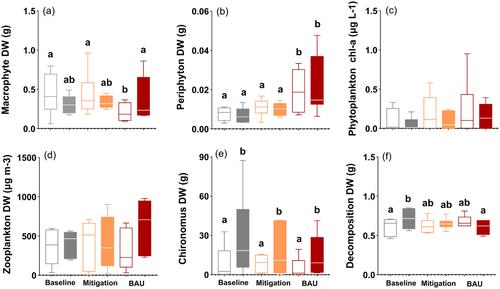当前位置:
X-MOL 学术
›
Glob. Change Biol.
›
论文详情
Our official English website, www.x-mol.net, welcomes your
feedback! (Note: you will need to create a separate account there.)
Interaction Between Climate Change Scenarios and Biological Invasion Reveals Complex Cascading Effects in Freshwater Ecosystems
Global Change Biology ( IF 10.8 ) Pub Date : 2024-10-22 , DOI: 10.1111/gcb.17540 Tauany Rodrigues, Pavel Kratina, Rayanne B. Setubal, Joseph L. S. Ferro, Douglas Hideki Abe, Luiza O. Costa, Clarice Casa Nova, Vinicius F. Farjalla, Aliny P. F. Pires
Global Change Biology ( IF 10.8 ) Pub Date : 2024-10-22 , DOI: 10.1111/gcb.17540 Tauany Rodrigues, Pavel Kratina, Rayanne B. Setubal, Joseph L. S. Ferro, Douglas Hideki Abe, Luiza O. Costa, Clarice Casa Nova, Vinicius F. Farjalla, Aliny P. F. Pires

|
Climate change often facilitates biological invasions, leading to potential interactive impacts of these global drivers on freshwater ecosystems. Although climatic mitigation efforts may reduce the magnitude of these interactive impacts, we are still missing experimental evidence for such effects under multiple climate change scenarios within a multi‐trophic framework. To address this knowledge gap, we experimentally compared the independent and interactive effects of two climate change scenarios (mitigation and business‐as‐usual) and biological invasion on the biomass of major freshwater trophic groups (phytoplankton, zooplankton, periphyton, macroinvertebrates, and a native macrophyte) and the decomposition rate of allochthonous material. Among the independent effects, we found that the business‐as‐usual climate treatment resulted in lower native macrophyte biomass and higher periphyton biomass compared to the climatic baseline and mitigation treatments. This indicates the potential of climate change to alter the relative dominance of different freshwater producers and demonstrates that climate mitigation efforts can counteract these effects. Biological invasion alone increased the biomass of chironomids, a dominant macroinvertebrate group in tropical freshwater ecosystems, demonstrating a compensatory effect on climate change. Climate change and biological invasion interactively reduced the decomposition rate of allochthonous detritus, likely mediated by the feeding preference of abundant chironomids for periphytic algae associated with the presence of non‐native macrophytes. We concluded that (i) climatic mitigation can maintain climate baseline conditions in freshwater ecosystems, and (ii) the interactive effects between future climate scenarios and biological invasion are related to complex cascading interactions among trophic groups on ecosystem processes.
中文翻译:

气候变化情景与生物入侵之间的相互作用揭示了淡水生态系统中复杂的级联效应
气候变化通常会促进生物入侵,导致这些全球驱动因素对淡水生态系统产生潜在的互动影响。尽管气候缓解工作可能会降低这些互动影响的程度,但我们仍然缺乏在多营养框架内的多种气候变化情景下产生这种影响的实验证据。为了解决这一知识差距,我们实验比较了两种气候变化情景(缓解和一切照旧)和生物入侵对主要淡水营养群(浮游植物、浮游动物、围生植物、大型无脊椎动物和本地大型植物)生物量的独立和交互影响和异质物质的分解速率。在独立影响中,我们发现与气候基线和缓解处理相比,照常气候处理导致较低的本地大型植物生物量和较高的围生植物生物量。这表明气候变化有可能改变不同淡水生产者的相对主导地位,并表明气候缓解措施可以抵消这些影响。仅生物入侵就增加了热带淡水生态系统中占主导地位的大型无脊椎动物群 chironomids 的生物量,显示出对气候变化的补偿作用。气候变化和生物入侵相互作用地降低了异质碎屑的分解速率,这可能是由与非本地大型植物的存在相关的丰富的 chironomids 对围生藻类的摄食偏好介导的。 我们得出的结论是,(i) 气候减缓可以维持淡水生态系统的气候基线条件,以及 (ii) 未来气候情景与生物入侵之间的交互作用与营养群之间对生态系统过程的复杂级联相互作用有关。
更新日期:2024-10-22
中文翻译:

气候变化情景与生物入侵之间的相互作用揭示了淡水生态系统中复杂的级联效应
气候变化通常会促进生物入侵,导致这些全球驱动因素对淡水生态系统产生潜在的互动影响。尽管气候缓解工作可能会降低这些互动影响的程度,但我们仍然缺乏在多营养框架内的多种气候变化情景下产生这种影响的实验证据。为了解决这一知识差距,我们实验比较了两种气候变化情景(缓解和一切照旧)和生物入侵对主要淡水营养群(浮游植物、浮游动物、围生植物、大型无脊椎动物和本地大型植物)生物量的独立和交互影响和异质物质的分解速率。在独立影响中,我们发现与气候基线和缓解处理相比,照常气候处理导致较低的本地大型植物生物量和较高的围生植物生物量。这表明气候变化有可能改变不同淡水生产者的相对主导地位,并表明气候缓解措施可以抵消这些影响。仅生物入侵就增加了热带淡水生态系统中占主导地位的大型无脊椎动物群 chironomids 的生物量,显示出对气候变化的补偿作用。气候变化和生物入侵相互作用地降低了异质碎屑的分解速率,这可能是由与非本地大型植物的存在相关的丰富的 chironomids 对围生藻类的摄食偏好介导的。 我们得出的结论是,(i) 气候减缓可以维持淡水生态系统的气候基线条件,以及 (ii) 未来气候情景与生物入侵之间的交互作用与营养群之间对生态系统过程的复杂级联相互作用有关。


















































 京公网安备 11010802027423号
京公网安备 11010802027423号